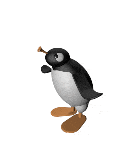The only penguins to breed in Africa, the African penguin ranges from Namibia to South-
africa.
When not hunting for food, African penguins are found along rocky shores or brushy coastal areas. Feeding is entirely at sea. They feed on 25 species of fish such as sardines and anchovy, squid and krill. A penguin may eat up to 1 pound of food or up to 14% of their weight.
African penguins, like other penguins, cannot fly due to their solid bone structure and lack of flight feathers on their wings. However, they can fly through the water at speeds up to 25 km per hour, and regularly dive for 2.5 minutes.
They are an endangered species. The population has decreased by 90% over the past 60 years with the numbers falling to about 100,000 birds.
Love,
Vicky






